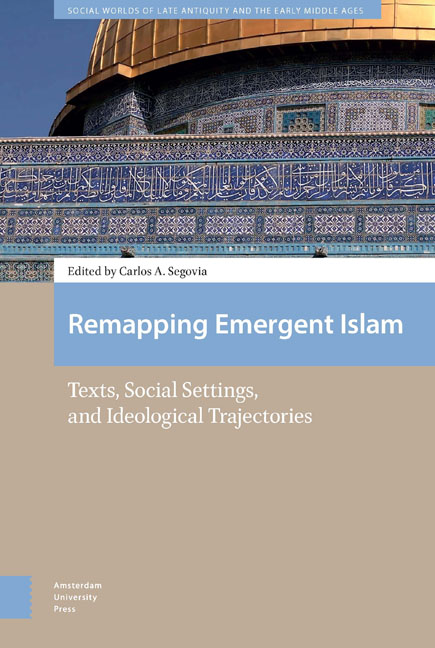Book contents
- Frontmatter
- Contents
- Introduction
- Part 1 Re-Assessing the Hypothesis of a Peripheral Jewish Background
- Part 2 An Encrypted Manichaean / Messalian Matrix?
- Part 3 Measuring the World’s Timeline… and Imagining the Afterlife at the Persian Court?
- Part 4 Conceptual Quicksand, Meta-Narratives of Identity, Texts and their Marginalia
8 - Echoes of Pseudepigrapha in the Qur’ān
Published online by Cambridge University Press: 24 November 2020
- Frontmatter
- Contents
- Introduction
- Part 1 Re-Assessing the Hypothesis of a Peripheral Jewish Background
- Part 2 An Encrypted Manichaean / Messalian Matrix?
- Part 3 Measuring the World’s Timeline… and Imagining the Afterlife at the Persian Court?
- Part 4 Conceptual Quicksand, Meta-Narratives of Identity, Texts and their Marginalia
Summary
Abstract
Tommaso Tesei addresses questions of quranic intertextuality which contribute to clarifying, among other things, the Qur’ān's undeniably scribal nature. The first part of this article focusses on Enochic elements (drawn from pseudepigraphical literature) in the quranic corpus. Specifically, it deals with the quranic characters of Idrīs and ‘Uzayr and the fallen-angels – traditions the echoes of which can be heard in the Qur’ān. Did the people in the Qur’ān's environment know those books which we tend categorise under the label of ‘Pseudepigrapha’ directly? Or did they merely encounter themes and motifs which happened to trace back to pseudepigraphical literature?
Keywords: Late Antiquity, Early Islam, Qur’ān, Pseudepigrapha
The relationship between the Qur’ān and the writings belonging to the biblical tradition have attracted significant scholarly attention since the very beginnings of modern quranic studies. The question has recently obtained renewed investigation within the more general trend of research that aims to re-situate early Islam in its late antique context. Reading the Qur’ān against the background of biblical and extra-biblical texts often offers scholars a valuable means to cut through the allusiveness that characterises quranic narratives. At the same time, such comparative analysis helps us to determine the degree to which knowledge of biblical traditions was widespread in the Qur’ān's environment. In this article, I will investigate the specific case of the Qur’ān's references to literary traditions otherwise preserved in the corpus of texts known as pseudepigrapha.
The study of intertextualities between pseudepigraphical writings and quranic narratives has attracted a good deal of scholarly attention in the past few years, which has focused mostly on two subjects. Scholars have investigated the echoes from pseudepigrapha in the Qur’ān principally with the aim to identify literary and religious traditions current in the contexts from which the early Islamic communities emerged. In spite of these investigations, however, scholarship on the subject is still relatively scant, while the topic is extremely wide. An adequate analysis would require at least a monographic study. The goal of this article is much more humble, as it mostly aims to present an overview of the status quaestionis.
The first two sections of the article are thematically focused on the elements from the Enochic literature in the Qur’ān.
- Type
- Chapter
- Information
- Remapping Emergent IslamTexts, Social Settings, and Ideological Trajectories, pp. 203 - 220Publisher: Amsterdam University PressPrint publication year: 2020



